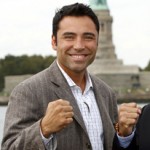
LAS VEGAS – Oscar De La Hoya said Wednesday that the Arizona immigration law is racist if it is allowed to stand as it was written.
“We’re looking at racism,’’ De La Hoya said during a news conference to promote the Juan Diaz-Juan Manuel Marquez rematch Saturday night at Mandalay Bay. “We really are.’’
De La Hoya made the comments while U.S. District Judge Susan Bolton filed an injunction in Phoenix against parts of SB 1070, delaying provisions that require immigrants to carry documentation and prohibits them from seeking employment on street corners or in parking lots. The law was scheduled to go into effect Thursday.
De La Hoya, president of Golden Boy Promotions and a fulltime promoter since he retired after a loss to Manny Pacquiao in 2008, said he would not stage cards in Arizona if the law is reinstated through likely legal fights, including an expected appeal by Arizona Gov. Jan Brewer.
Golden Boy promoted at Desert Diamond Casino near Tucson for a few years. The last Golden Boy card in southern Arizona was in the summer of 2009.
When asked if he could return to the state and promote again, De La Hoya said: “If they do lift the law, I would. But I don’t know now. If they don’t lift the law, then I don’t think we have business there.’’
Both Diaz and Marquez have fought in Arizona. Diaz, a Mexican-American lightweight, beat Fernando Angulo in 2006 at Chase Field in Phoenix. Marquez, a Mexican, has fought in Arizona twice, both in 2007 and both in Tucson. In his last Arizona bout, he beat Rocky Juarez, also of Houston, is also on Saturday night’s card at Mandalay Bay.
Six of the eight fighters on HBO’s pay-per-view portion have fought in Arizona, including middleweight Daniel Jacobs of New York junior-welterweight Robert Guerrero of Gilroy, Calif., and Joel Casamayor, an Olympic gold medalist from Cuba.
Diaz, an aspiring attorney, was born in Houston to parents, Olivia and Fidencio, who at the time were undocumented immigrants from Mexico.
“I talk about it with them and it hits home for them a little bit more,’’ said Diaz, whose parents took him back to Mexico briefly before returning to Houston. “They experienced it first-hand as far as crossing the border, dealing with border patrol and sometimes running from immigration. Those are some interesting stories.’’
The stories are also full of reasons to fear the SB 1070 if the courts allow it to be enforced, Diaz said.
“It’s a rough law,’’ he said. “It’s gonna infringe on a lot of human rights. Local law enforcement is going to take a little bit too much of the power that it has and abuse it. There’s going to be so many cases in which families and people are going to be abused that we’re not even going to hear about.’’
Despite his concern about the law’s potential abuse, Diaz said he would not rule out fighting in Arizona again.
“I’d have to look at the circumstances,” said Diaz, who Saturday hopes to avenge a loss to Marquez in the 2009 fight of the year. “I’m not going to sit here and say: ‘No, I’m never going to go fight.’
“You look at each, specific situation. If the situation is that they want to put on a show to raise money for immigrants, then it would be different. A lot of people automatically assume that they won’t fight there because of the law. But, like I said, I’d have to look at the circumstances. Then, say yes or no.’’
Marquez, who is from Mexico City, said the Arizona law has been talking point in his country ever since Brewer signed it in late April.
“It is bad, bad for me and bad for the Mexican people,’’ Marquez said. “Many Mexicans live in Arizona. I want to support them, help them through this.’’
De La Hoya said he understands those who argue that the United States has to defend its borders and maintain a process through which immigrants can gain legal entry.
“If you are illegal in this country and you’re a person who doesn’t come here to work and to help build America and to be in gangs and commit crimes and this-and-that, then, you-know-what, maybe you should go back,’’ said De La Hoya, who fought at then-America West Arena in Phoenix twice early in his career.”But if you are a person who is this country to help build America the way immigrants built America back in the day, then I think they do have a chance, that there should be fairness.
“I understand that there has to be a process, of how that is regulated.’’
De La Hoya says the law targets Mexicans and Americans of Mexican descent.
“They were thinking that this is meant for European immigrants, this is meant for the Asian immigrant,’’ said De La Hoya, who grew up in Los Angeles before becoming the world’s most popular and richest boxer after winning an Olympic gold medal for the U.S. at the 1992 Barcelona Games.
De La Hoya points to Arizona large Hispanic community, which is estimated to be about one-third of the state’s population.
“So, to a certain extent, I call it racism,’’ De La Hoya said. “I really do. What happens now? I got to Arizona. I look Hispanic. They pull me over and ask for my ID? It’s not fair.’’









